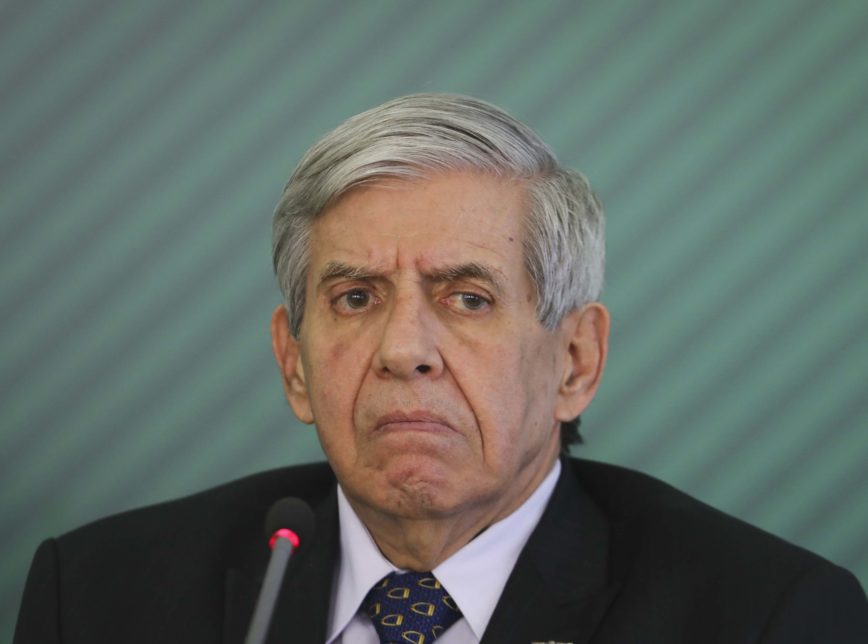RIO DE JANEIRO, BRAZIL – Minister of the Institutional Security Cabinet (GSI), General Augusto Heleno, said yesterday, September 21st, that the debate on the environment has been distorted by foreign nations and celebrities with the “obviously covert but clear goal of damaging Brazil and overthrowing President Jair Bolsonaro’s government”.
Heleno and other government Ministers took part in a public hearing convened by Federal Supreme Court (STF) Justice Luís Roberto Barroso on the current state of environmental issues in Brazil.

Not naming any specific country or organization, Heleno also said that foreign powers and non-governmental organizations use false arguments and fabricated and manipulated data “to portray us as villains of deforestation and global warming”. He said it is “necessary to clarify that the Brazilian Amazon belongs to us.”
The Minister also commented on the increase in fires in the Amazon region, stating that there are natural causes that favor the phenomenon. “It is important to emphasize that the subject is highly controversial. There is no scientific evidence that the increase in fires in primary forests is the result of the federal government’s inaction. In fact, they are related to natural phenomena, which human action is incapable of preventing,” said the GSI Minister.
Heleno was supported by the Minister of Science and Technology, Marcos Pontes, who then spoke. “Logically the increase in the planet’s temperature creates a better condition for fires, that is, it leads to a greater number of fires on the whole planet, as well as the weather itself; phenomena like El Niño also interfere with rain periods and the higher incidence of fires,” he said.
STF Justice Barroso is the rapporteur of a claim of non-compliance with a fundamental precept (ADPF) that questions the government’s purported shutdown of the National Fund on Climate Change (Fundo Clima). The lawsuit was brought by four opposition parties – PT, PSOL, PSB, and Rede Sustentabilidade. The hearing will continue until this afternoon, September 22nd.
Other officials also attended the hearing yesterday morning, among them Chamber president Rodrigo Maia, and representatives of bodies such as the Brazilian Institute of Environment and Renewable Natural Resources (IBAMA), Chico Mendes Institute for Biodiversity Conservation (ICMBio), and the National Bank for Economic and Social Development (BNDES).
In addition to Heleno and Pontes, Ministers Ricardo Salles, of Environment and Tereza Cristina of Agriculture, also spoke about the government’s efforts.
According to Salles, the action plan for the Climate Fund has already been drawn up, the management committee is already in place, and the resources to implement the projects have already been transferred to BNDES, in the amount of R$581 million. Therefore, he argued that the ADPF complaint is now moot and should be dismissed by the Supreme Court, given that the plaintiffs called for these measures to be taken.
The delay in proceeding with the Fundo Clima’s agenda was due to the slow pace of Congress in passing the sanitation legal framework, sanctioned in July by the government, justified the Minister.
He said the lack of sanitation, “in a country where 100 million people do not have sewage collection and treatment and 35 percent do not even have drinking water,” is the main environmental issue in Brazil and also contributes to the emissions into the atmosphere and climate change issues.
“So, the transfer of resources to BNDES and this new understanding of how to implement it are related to the requirement of aligning this urban environmental quality agenda, which is very relevant to the question of emissions and has become a priority given the chaos of sanitation and garbage in Brazil,” he explained.
Salles said that the federal government has developed the Mais Floresta (More Forest) program, with an investment of R$500 million for small producers, traditional and riverside communities, which adopt environmentally-friendly measures. He also mentioned the ‘Adote um Parque’ (Adopt a Park) program, which enables private investors to sponsor the preservation of 132 conservation units in the Amazon, which altogether account for 15 percent of the national territory.
According to the Minister, these programs are directly related to the climate issue, because, in his opinion, Brazil is responsible for less than three percent of world emissions, “which come from fossil fuels that are burned by developed countries since the Industrial Revolution.”
“We have to contextualize this in order not to be labeled as the main culprits of global emissions and end up in a trade war that tries to blame our agriculture or Brazil for the responsibilities that are, notably, of industrialized countries that continue to burn fossil fuels,” he argued.
Salles further said that the government’s environmental agenda involves aggregating the private sector, generating market mechanisms, be it on climate, carbon credit or forests.
“These are needed tools to remove Brazil, mainly the Amazon, from this situation of poverty and low HDI (Human Development Index) in the wealthiest region of the country and, thereby, monetize the forest, maintaining the logic that a standing forest must be worth more than a devastated forest,” he said.
In her address, Minister Tereza Cristina stressed that Brazil uses 30 percent of its territory for agriculture and livestock and maintains over 66 percent of native vegetation, of which about 25 percent are located on private property.
While presenting the public policies implemented by the government in the sector, she explained that the innovation and sustainable production agenda is one of the Ministry’s priorities.
“Agriculture is closely linked to the environment. The synergy between nature, productive techniques, and rural man is precisely what makes Brazil an agro-environmental power,” she said.
The Minister said that in recent years, 123.7 million hectares of land have ceased to be incorporated into agricultural activity due to techniques that increase productivity in the field.
Source: Agência Brasil

